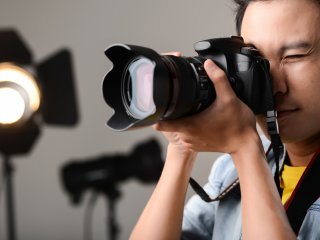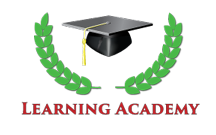
- Description
- Objectives
- Outline
- Materials
- System Requirements
- Watch a Demo
This Professional Photography course reflects a comprehensive mix of scholarly and practical information. It covers every aspect of photography, from capture through to output, both digital and analogue. There is an emphasis on explaining the 'how to' of photography, but also includes in-depth coverage of the fundamental principles that govern the art, such as how light behaves, optics, and the basis of exposure. This course ensures that the student comes away with not only a good grasp of photographic technique, but also an in-depth understanding of the fundamentals that will help them to better understand how great photography is made. As such, it functions both as an excellent course for students of photography, and a great primer and reference for amateur enthusiasts.
NOTE: Adobe Photoshop is NOT included in this course. Students will need to have their own copy of this software installed on their computer.
Prerequisite(s): None
After completing this course, you should be able to:
- Identify the basic principles of photography and camera anatomy
- List the steps involved in processing photographs
- Recall digital photography techniques, including composition
- Recognize the basics of establishing depth of field, perspective, and lighting
- Define techniques for improving your photographs, including corrective elements and special effects
Professional Photography Module 1
Camera Anatomy
- Focusing and Setting the Exposure
- Taking Your Picture
- What Will You Photograph?
- Shutter
- Aperture
- Choosing a Camera
- Keeping a Camera Steady
Professional Photography Module 2
Lens and Exposure
- Lens Focal Length
- Focusing Lens
- Focus and Depth of Field
- Perspective
- Guidelines for Buying a Lens
- Exposure Basics
- How to Meter
- Responding to Light
- Film and Sensor Speed
- Using Filters
Professional Photography Module 3
Light, Color, and Film Negatives
- Color: Additive or Subtractive
- Color Characteristics
- Color Balance
- Adjusting Color with Film
- How to Process Black-and-White Roll Film
- Processing Black-and-White Roll Film Step by Step
- How Film Processing Affects Your Picture
- Exposure and Development: Under, Normal, Over
Professional Photography Module 4
Darkrooms and Digital Pictures
- Black-and-White Printing
- Controlling Contrast
- Dodging and Burning
- Toning for Color and Other Effects
- Making a Color Print from a Negative
- Hardware and Software
- Capturing Detail
- Channels
- Importing Your Images
Professional Photography Module 5
Image Editing and Printing Digitally
- Digital Post Processing
- Adjusting Shape
- Adjusting Color and Value
- Editing Commands
- Compositing
- Printers
- Printing Options
- Displaying Your Work
- Ethics: How Far Can You Go?
Professional Photography Module 6
Organizing and Lighting
- Image Storage
- Metadata: Data About Your Files
- Arching Digital Images
- Arching Film and Prints
- Mounting a Print
- Artificial Light
- Outdoor and Indoor
- Lighting with Flash
- Portrait Lighting
Professional Photography Module 7
Extending the Image and View Camera
- Using Scale
- Multiple Images
- Alternative Processes
- Using Projections
- How to Make a Close-Up Photograph
- Zone System
- View Camera Movements
- Using a View Camera to Control the Image
Professional Photography Module 8
History of Photography
- Framing the Subject
- Backgrounds
- Spot/Line
- Shape/Pattern
- Emphasis/Balance
- Using Contrasts of Sharpness
- Using Contrasts of Light and Dark
- Placing the Subject within the Frame
- The Invention of Photography
- Photojournalism
- Color Photography Arrives
**Outlines are subject to change, as courses and materials are updated.**
Ed4Career is committed to being both environmentally conscious and making it easier for you to study! We’re making your education mobile! All of our textbooks are now provided as eTextbooks. You can access them on your laptop, tablet, or mobile device and can study anytime, anywhere.
The move away from physical books to eTextbooks means you get the latest, most up-to-date version available. This also makes your training more accessible, so you can study anywhere you have your phone or tablet. The best part is that all materials are included in your training cost so there are NO extra fees for books!
Internet Connection
- Broadband or High-Speed - DSL, Cable, and Wireless Connections
*Dial-Up internet connections will result in a diminished online experience. Classroom pages may load slowly and viewing large audio and video files may not be possible.
Hardware Requirements
- Processor - 2GHz Processor or Higher
- Memory - 1 GB RAM Minimum Recommended
PC Software Requirements
- Operating Systems - Windows 7 or higher
- Microsoft Office 2013 or higher. Also, you could use a general Word Processing application to save and open Microsoft Office formats (.doc, .docx, .xls, .xlsx, .ppt, .pptx)
- Internet Browsers - Google Chrome is highly recommended
- Cookies MUST be enabled
- Pop-ups MUST be allowed (Pop-up Blocker disabled)
- The Kindle Reader App or VitalSource Bookshelf App are needed for many of our courses (No special equipment needed. This can be downloaded for FREE onto your computer.)
- PowerPoint Viewer (if you do not have PowerPoint)
- Adobe PDF Reader
- QuickTime, Windows Media Player &/or Real Player
MAC Software Requirements
- Operating Systems - Mac OS x 10 or higher with Windows
- Mac office programs or a Word Processing application to save and open Microsoft Office formats (.doc, .docx, .xls, .xlsx, .ppt, .pptx)
- Internet Browsers- Google Chrome is highly recommended
- Cookies MUST be enabled
- Pop-ups MUST be allowed (Pop-up Blocker disabled)
- The Kindle Reader App or VitalSource Bookshelf App are needed for many of our courses (No special equipment needed. This can be downloaded for FREE onto your computer.)
- PowerPoint Viewer (if you do not have PowerPoint)
- Adobe PDF Reader
- Apple QuickTime Media Player


